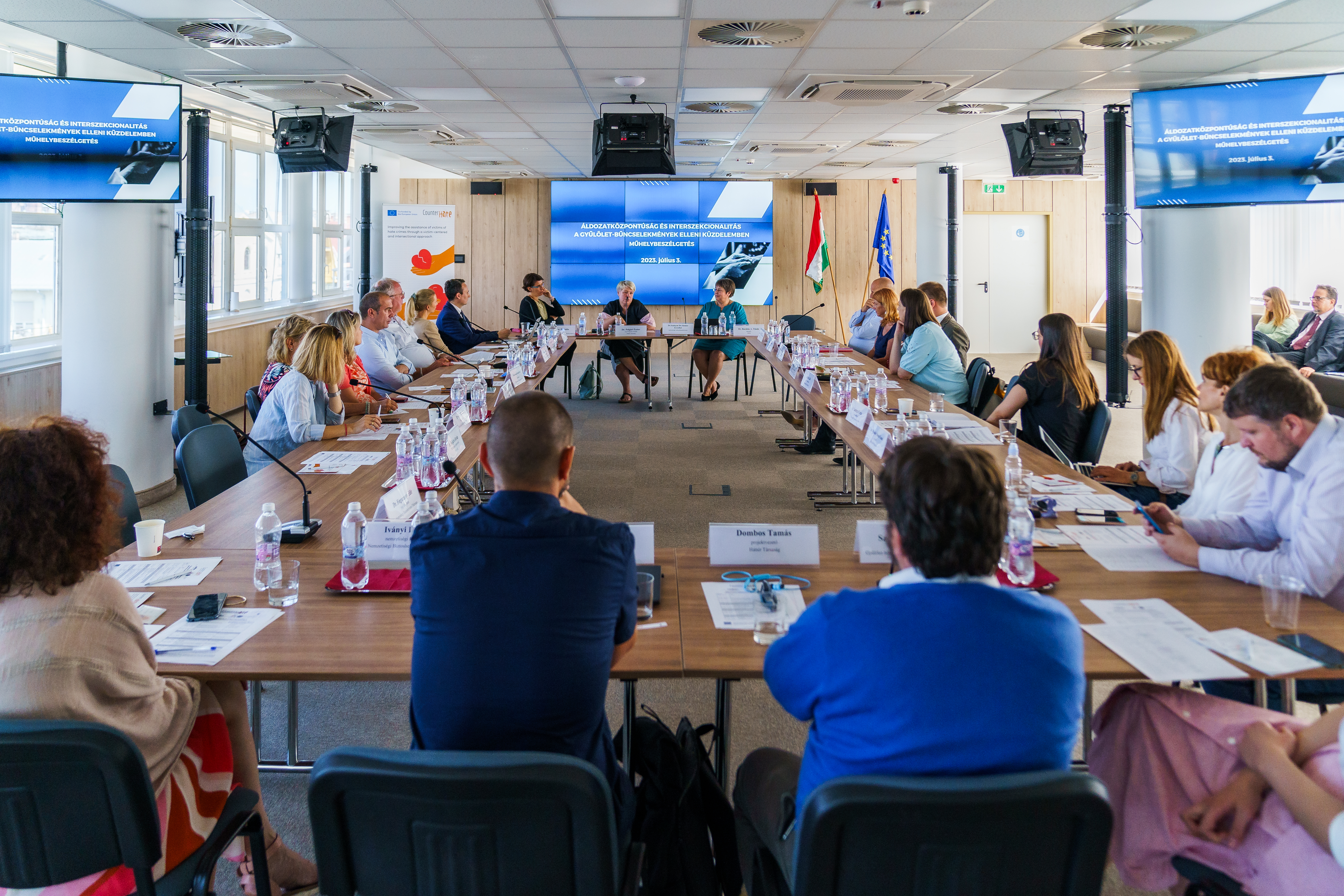Workshop on victim-centred approach and intersectionality in the fight against hate crime - NJBH-EN
null Workshop on victim-centred approach and intersectionality in the fight against hate crime
In a special workshop organised by the Minority Ombudsman and the Working Group on Hate Crime, national experts in the field discussed good practices on the protection of victims of hate crime. The event brought together judges, prosecutors, police officers, lawyers, the high-ranking officials of the Ministry of Justice, the Victim Support Centre, the National Institute of Criminology and NGOs to share their professional experiences and to summarise the current challenges in this field. The main objective of the joint reflection was to identify the judicial, law enforcement and policy services, projects and campaigns that are needed in Hungary and in Europe to protect victims and strengthen their procedural role. In addition to Working Group on Hate Crime, the Hungarian member of the related EU project, Háttér Society, and Res Iudicata – Judges for Social Awareness Association were key partners in the organisation and implementation of the event.
In her opening speech, Elisabeth Sándor-Szalay pointed out: the topic has been a priority for her since 2020. In the past three years, she has dealt with 27 complaints in which the petitioner specifically referred to hate crimes and their “catalyst acts”, such as deteriorating public discourse, racist and anti-Semitic hate speech, group or march demonstrations by far-right organisations, the use of banned authoritarian symbols and the vandalisation of community memorials and monuments. These resulted in 8 key professional papers, totalling 245 pages, which sought to persuade legislators and law enforcement to move towards a more effective and people-centred system and tools.
In view of the above, a hybrid (online and personal participation) conference on “Current challenges and opportunities in tackling hate crime – through criminal law and beyond” was held in December 2022 with 150 participants and a high level of interest. Following a clear and uniformly positive professional response, the experts indicated the need to continue the dialogue, and to take a detailed look at the situation in specific areas of the subject. The EU-funded Counter Hate Project (https://www.udg.edu/en/projectes/counter-hate), which aims to improve support for victims of hate crime through a victim-centred and intersectional approach, provided a good opportunity to do so.

Under this EU programme, experts and NGOs from six Member States mapped and assessed national hate crime legislation and policies. The Hungarian partner in the project was the Háttér Society. The results of the research, published in May 2023 (https://zenodo.org/record/7885567#.ZFDJwOxBzst), provide valuable insights into the experiences of victims and key professionals, as well as the views of NGOs working in the field.
The second phase of the project, following the report, was introduced by a workshop in each country on good practices in victim protection. It allowed the national institutions and NGOs concerned to discuss their experiences and to identify further judicial, law enforcement and policy services, projects and campaigns that they consider necessary.
During the workshop on “Victim-centred approach and intersectionality in the fight against hate crime” on 3 July, participants reviewed the possible definitions of victim-centred approach, the specific challenges for victims in hate crime prosecutions, the implementation of victim-centred approach and the obstacles to its implementation in Hungarian practice, using small group and plenary working methods, in addition to the professional presentations. Following the presentations, the participants analysed how intersectionality aspects are reflected in the fight against hate crime through case studies. The workshop also provided an opportunity for participants to learn about each other's perspectives on victim procedures and measures, as well as international good practices whose implementation in Hungary could help to reduce the latency in hate crime and to promote the wider dissemination and application of a victim-centred approach. Participants and organisers represented a wide range of personal and professional experiences and stakeholders: the discussion covered women, Roma or other nationalities, Jews, LGBT, people with disabilities, homeless or refugee people, and victims of violence against them – both at individual and community level.
The representatives of the organisations present at the event agreed that there has been an excellent cooperation between public authorities and professional civil society organisations on this issue for many years, thanks to which the legislation is already progressive. Of course, there is still work to be done in the practical implementation of the principles and procedural rules laid down in the legislation, but the workshop and similar professional meetings can help in this respect. Effective and coordinated criminal justice and academic action, the professional, non-judgemental and victim-centred action by representatives of the official bodies that engage in first contact with the victims, the means to prevent secondary victimisation, and measures to ensure accessibility of criminal proceedings (victims' rights, easy understanding, use of language, mediation) were identified as particularly important challenges.